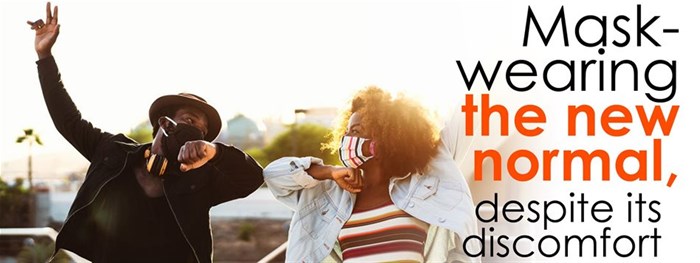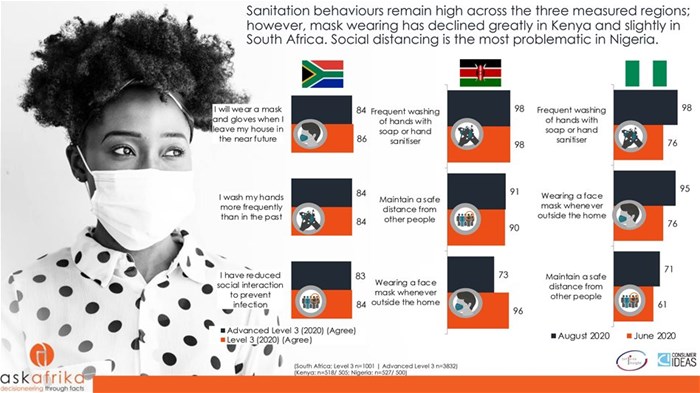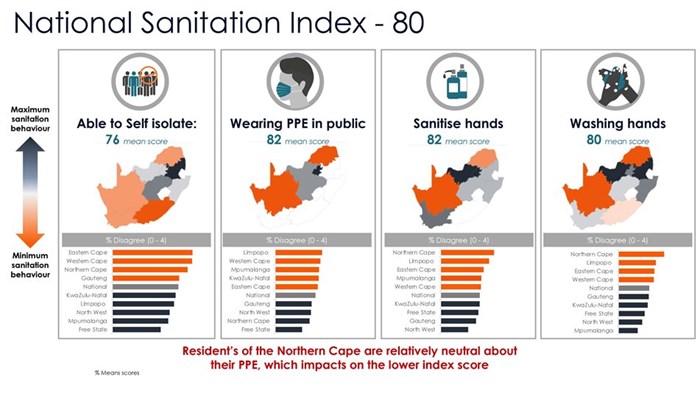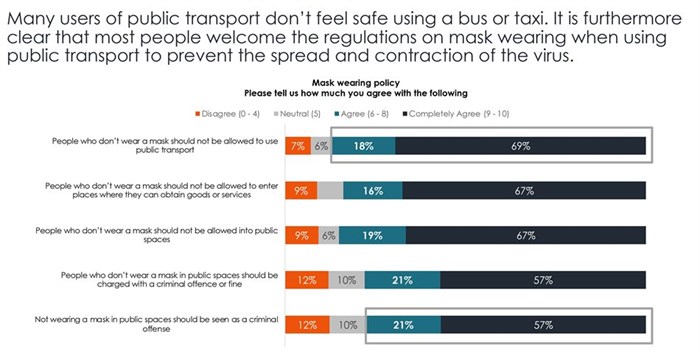Mask-wearing the new normal, despite its discomfort
However, in order for face masks to offer the necessary protection against the virus they need to be worn correctly, and the right type of masks needs to be used. According to WHO (2020), valve masks offer little protection given that an infected individual wearing this kind of mask will expel respiratory droplets through the valve, which increases the risk to individuals around them.
As the number of reported positive cases of Covid-19 continues to rise in SA, medical experts and government have renewed their calls to citizens to continue to be cautious, to keep wearing masks in public and to regularly wash their hands.

According to Ask Afrika’s COVID-19 Tracker study, a pro bono research study the company has been conducting since the first week of April in order to better understand the socio-economic impact that the coronavirus, lockdown and gradual re-opening of the economy has on South Africans, a sense of personal agency remains high with 82% of citizens taking responsibility for their own health.
The study aims to give equal voice to citizens about their experiences during this time. The sample is proportionally distributed according to the South African demographic profile. Complimentary to the South African leg of the research, the study has also extended to African citizens living in Kenya and Nigeria.
While sanitation behaviour remains high across South Africa, Kenya and Nigeria, in Kenya mask wearing has declined to 73% while social distancing is the most problematic in Nigeria.

In South Africa 73% of respondents believe that those that break the rules are putting others at risk. The Ask Afrika National Sanitation Index has tracked citizens’ adherence to preventative measures since the inception of lockdown and the majority of citizens (82%) wear PPE in public and sanitize their hands. A total of 80% of respondents say they wash hand on a regular basis while 76% self-isolate where possible.
The majority of citizens are committed to play their part to beat the virus, especially given the easing of rules and restrictions. Of concern, however, is that in isolated cases (8-9%) citizens are not wearing PPE in public. This is most prevalent amongst those living in Limpopo, Western Cape, Mpumalanga, Kwa-Zulu Natal, and the Eastern Cape.

Mask wearing has come to be viewed as a necessity and is motivated by a sense of personal responsibility, primarily to protect myself (80%), followed by the protection of others (64%). Most citizens wear masks in public spaces (82%), during shopping trips (68%) or using public transport (56%). Almost two-thirds (59%) manage the discomfort of difficulty breathing when wearing a mask by occasionally lifting the mask. Despite the discomfort, 87% of citizens agree that un-masked fellow citizens should not be allowed to use public transport or visit public places, while a further 78% agree that not wearing a mask in public spaces should be seen as a criminal offense.

The high National Sanitation Index is largely driven by increased mask-wearing and handwashing behaviours as well as citizen’s commitment to hand sanitizing outside their homes, especially during shopping trips. As these behaviours increased over the lockdown period, it indicates greater awareness of how the virus spreads and how to prevent it, coupled with a personal motivation among citizens to protect themselves and others from contracting the virus.
For more information on Covid-19 research opportunities please contact:
Andrea Rademeyer, CEO and Founder: Ask Afrika (Pty) Ltd
Email: az.oc.akirfaksa@reyemedar.aerdna | az.oc.akirfaksa@tcennoc
Web portal: www.askafrika.co.za
About Ask Afrika
Ask Afrika is a Decisioneering company. We support our clients’ decisions through facts. Our clients’ decision requirements are around social research and philanthropy, experience measures and advisory and brand dynamics.
Social research decisions are required around HIV/Aids and most recently Covid19. Educational and early childhood development, fair-trade shopping, media and financial research- are some of the areas we love to work in. NGO’s, Public- and Private Sector clients work with us to get the pulse of nations.
Besides being decisioneers in brand and customer experience research, Ask Afrika is well known for creating some of the most useful, go-to industry benchmarks, including the Ask Afrika Orange Index®, the Ask Afrika Icon Brands®, the Ask Afrika Kasi Star Brands and the Target Group Index (TGI). Ask Afrika’s knowledge of brands is extensive and the Target Group Index (TGI) survey; which measures psychographics, service, products, media and brands- has been used by the majority of the top 50 advertisers and media owners in South Africa for nearly two decades.
Our clients operate across various industries, including retail, telecoms, finance, and the public sector. We offer tailor-made and ready-to-use offerings for all our clients regardless of the size of project.
We are brave, agile, vibrant and experimental. We apply deep thinking and are great in everything we do, to make an impact that matters.
With us, you can make game-changing business decisions confidently.

About Andrea Rademeyer & Dr Amelia Richards
Andrea Rademeyer is the CEO & Founder of Ask Afrika & Dr Amelia Richards.- From speed to smiles: Redefining CX in telecoms23 Jan 09:26
- Winning customer experience in the medical industry: A GPS for customers09 Dec 14:57
- Superior data for big decisions: TGI leads consumer profiling in SA28 Nov 13:08
- Threefold TGI innovations put the spotlight on the humans in and behind the data10 Oct 11:18
- Discovery takes first 2 places on Ask Afrika Orange Index winners podium29 Aug 11:02
Related
From speed to smiles: Redefining CX in telecoms 23 Jan 2025 eMedia investments COO Antonio Lee appointed BRC chairperson to drive audience research innovation 18 Dec 2024 Winning customer experience in the medical industry: A GPS for customers 9 Dec 2024 Superior data for big decisions: TGI leads consumer profiling in SA 28 Nov 2024 Ask Afrika founder, Andrea Rademeyer chairs ESOMAR Congress, a first for Africa 19 Sep 2024 Discovery takes first 2 places on Ask Afrika Orange Index winners podium 29 Aug 2024

























